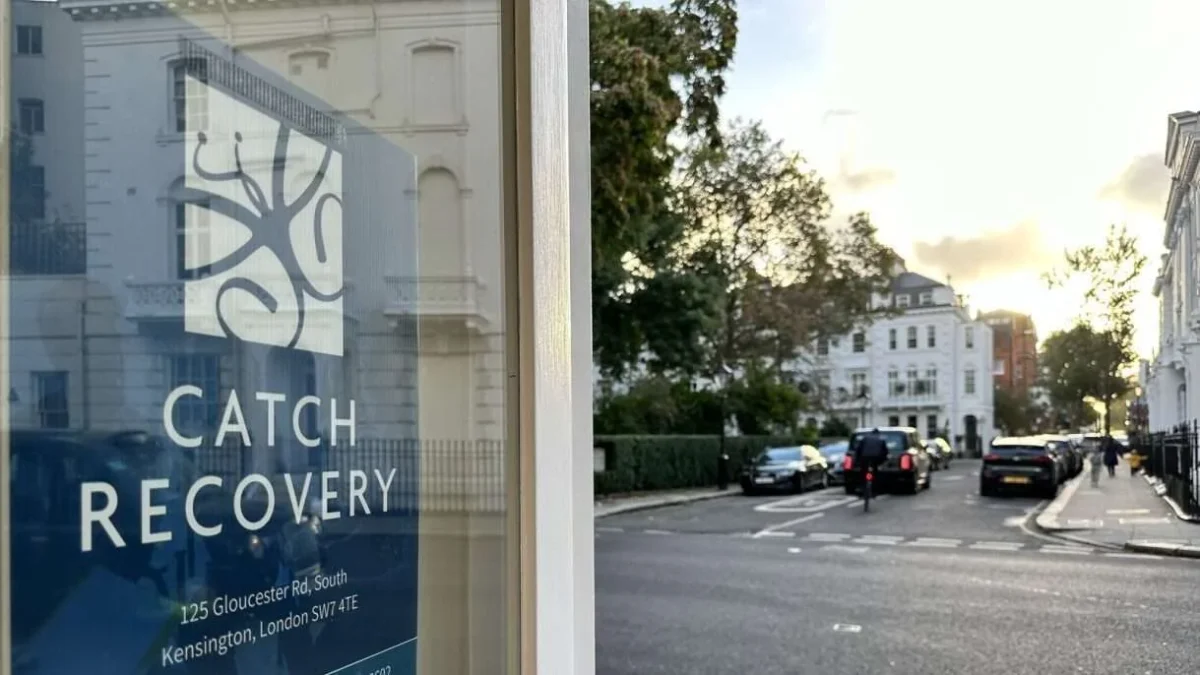
Start Your Recovery From Drug Addiction
At CATCH Recovery, our Drug Rehab Programme is designed to address both the physical and psychological aspects of substance addiction. We provide treatment for patients who are dependent on a range of substances including both illicit and prescription drugs.
Our experienced and compassionate team provide:
- Personalised Treatment Plan
- Outpatient Programmes
- Evidence-Based Therapeutic Treatments
- Continuing Care
Contact us today to learn more about our Drug Rehab Programme, and find the right support for your situation. You don’t have to go through this alone—our experienced therapists are here to help.
If you are reading this, it is likely that you or someone you care about needs help with their drug use. Drug rehabilitation – or rehab as it is more commonly known – is a medical and therapeutic treatment process for people who have become addicted to using substances.
The goal of rehab is to help patients stop using drugs or alcohol, explore the underlying causes of their substance misuse, and build support networks to enable long-term recovery and avoid relapse in the future. ‘Private’ rehab simply means that you are looking to pay the costs of treatment yourself or via private healthcare insurance, at an independent addiction treatment provider.
Whether you are looking for ketamine rehab, amphetamine rehab, crack cocaine addiction treatment, alcohol rehab or treatment for prescription drug addiction – this page will help you to understand how private drug rehab works and the benefits of choosing a trusted addiction treatment provider like CATCH Recovery.

Start The Recovery Process Today
On This Page
How Does Private Drug Rehab Work?

Drug rehab is designed to address both the physical and psychological aspects of addiction. While in rehab, patients are supported to stop using substances, with trained medical staff on hand 24/7 to oversee the detox process and manage any physical withdrawal symptoms.
After detox, daily group and individual therapy sessions help patients to develop a better understanding of their addictive behaviour and learn new ways to cope with stress in the future without resorting back to drugs.
A key part of the addiction recovery journey involves exploring the causes of the addictive behaviour, and learning how to identify and manage the triggers and cravings for drug use. Each patient is given a personalised treatment plan, based on proven addiction treatments and evidence-based talking therapies such as the 12 Steps model, Cognitive Behavioural Therapy (CBT), and Dialectical Behaviour Therapy (DBT).
Patients work with their therapists to explore the underlying reasons for their addictive behaviour, and to develop new coping strategies to reduce the risk of relapse once treatment ends. Group therapy sessions allow patients to share experiences and get to know other people in addiction treatment, building a recovery support network that can be invaluable going forwards.
Each patient’s circumstances are different, and the type of therapeutic input needed for recovery will vary according to a range of individual factors. Treatment is tailored according to the type of substance being used, and whether there are any other complications such as an addiction to more than one substance, additional mental health difficulties, or unresolved trauma to address.
At CATCH Recovery, all of our highly skilled therapists are registered with either the British Association for Counselling and Psychotherapy (BACP), or Counselling and Psychotherapy in Scotland (COSCA).
Common Drug Addictions Treated in Rehab
Drug rehab provides treatment for patients who are dependent on a range of substances including both illicit and prescription drugs, as well as alcohol. Illicit drugs include substances such as heroin, cocaine, ketamine, and cannabis. Common prescription drug addictions often involve opioids, benzodiazepines, or prescription pain killers.
-
Alcohol Addiction
One of the most common substances to be misused. However, given how many people drink alcohol regularly as part of everyday life, the signs of addiction can often go unnoticed at first. If someone has increased the amount they drink, has started drinking more frequently, or is prioritising drinking over other commitments, this could indicate a problem. 1
-
Cocaine Addiction
Made from the coca plant, this drug stimulates the body, increasing heart rate and making you feel intense emotions such as extreme confidence or excitement. It can be taken as a powder or smoked in the form of crack cocaine. 2
-
Heroin Addiction
A highly addictive opioid drug. Heroin can be heated on foil and smoked, mixed with water and injected, or snorted. Heroin addiction can be highly challenging to overcome due to intense physical withdrawal symptoms. 3
-
Opioid Addiction
This group of substances includes pain relief medication such as codeine, morphine, and oxycodone, which are typically used to manage pain. Long-term use of prescription opioid drugs can lead to increased tolerance, and over time this can lead to dependency.
-
Benzodiazepine Addiction
These are prescription drugs which have a calming effect and are used to manage anxiety and insomnia. While benzodiazepines may be useful in the short term, longer-term use can become problematic.
Choosing a Drug Rehabilitation Programme

Find Your Nearest CATCH Recovery Service
With so many private rehab centres available, it can be hard to choose where to go for treatment. However, there are a number of factors to consider when deciding which rehab centre might be right for you. These include:
-
Type of clinic
Would you prefer to spend time away from your usual routine in a residential facility? Or would you prefer – or need – to stay living at home while you receive treatment, perhaps because of work or family commitments?
-
Treatment model
Find out about the treatment approach and philosophy. How does the rehab centre talk about substance misuse? Rehabs use different treatment approaches so think about whether the provider’s perspective makes sense to you.
-
Length of programme
How long does treatment last? It is vital to stay in addiction treatment for long enough, as research shows that recovery outcomes are better for longer spells of treatment. 5
-
Treatment environment
Consider where the rehab is based and whether you like the location. Does the surrounding environment seem conducive to healing and recovery? If it’s a residential clinic, check out what the bedrooms and communal spaces look like.
-
Activities
Are there things to do in addition to the therapy schedule? You are likely to be in rehab for several weeks and so will want to be able to do different things in your relaxation time.
-
Staffing
/Find out what you can about the treatment team. What is the ratio of staff to patients? Ask questions about the training and qualifications of staff members if anything seems unclear.
-
Reputation
See what you can find out about the clinic’s reputation. How long has it been operating, and are there any evaluation reports demonstrating treatment outcomes? See if there are any online reviews or testimonials from previous clients. All of these things will help you to build a picture of what the rehab centre is like, and whether it is the right place for you.
Should I Choose Residential or Outpatient Drug Treatment?
One of the first things to consider is whether you want to spend a period of time in residential treatment away from your usual life and potential triggers, or whether you would prefer to stay living at home and attend rehab sessions during the day.
Residential rehab treatment is more intensive and will involve spending a number of weeks living in a rehab centre, supported around the clock by specialist addiction and medical staff. Inpatient treatment is usually recommended if you have a severe addiction, and is necessary for people who need to be monitored by medical professionals while they detox from using substances.
It can also be helpful for people who want to address other mental health issues alongside their addiction. Inpatient care also allows patients to access a range of complementary therapies to support their addiction recovery. These can include holistic treatments such as yoga, mindfulness meditation, and art. Being away from home, in a different environment where you can immerse yourself in recovery activities, can often prove highly beneficial.
Outpatient rehab tends to be better-suited to patients with milder drug addictions, those who are in the early stages of developing a dependency, or people who have already attended a residential programme and are looking for ongoing support after finishing inpatient treatment.
Outpatient treatment is particularly useful for people who are seeking addiction rehabilitation but who are unable to spend a period of time away from home.
CATCH Recovery provides both inpatient and outpatient care for drug and alcohol addiction. Outpatient drug therapy can be offered either online or in-person in London, Guildford, Edinburgh or Glasgow, with referral to residential clinics in Scotland and Ireland as needed. We also have outpatient addiction treatment services in Malta and Turkey.

Take The First Step Today
Key Benefits of Private Drug Addiction Treatment
Whether you opt for residential or outpatient treatment, there are many advantages to choosing private drug addiction treatment. These include:
Speed: private treatment providers are usually able to offer treatment very quickly. You are less likely to become stuck on a long waiting list, which means you can start your recovery journey much faster.
Personalised care: private providers tend to have more staff available for patients, which means treatment can be carefully tailored for individual needs. At CATCH Recovery, all patients are allocated a specific focal therapist, who they work closely with throughout their recovery programme.
Quality of treatment: evidence-based treatment is essential, and at CATCH Recovery, we only use the most up-to-date talking therapies and techniques. This means you can be confident that you are receiving the very best addiction treatment to support lasting recovery.
Family support: drug addiction impacts the whole family unit, not just the person with the addiction. Private treatment providers often provide support and family therapy so that all members of the family can recover and rebuild their relationships.
Drug Rehab Cost & Payment Options
The cost of drug rehab and the payment options available will mostly depend on whether you choose residential or outpatient treatment.
-
Residential Programme Costs
Residential programmes cost from £3000 per week. This fee covers:
- Accommodation
- Food
- Medically-managed drug detox
- Support from a psychiatrist (if required)
- Daily individual and group therapy sessions
- Workshops on addiction awareness and ways to prevent relapse
- Support for family members with therapy and workshops
- Comprehensive free aftercare programme to provide continuing care after patients leave
Treatment can be paid for by the patient, via an approved private healthcare insurance plan, or sometimes through the NHS.
-
Outpatient Programme Costs
Outpatient drug programmes cost from £1500 for a 28-day programme. This includes:
- Screening and psychiatric assessment
- In-person or online treatment
- Individual and group therapy sessions
- A dedicated focal therapist to work closely with you
Outpatient treatment is self-funded. To find out more about the cost of different treatment options, call our admissions team for a confidential discussion about what is right for you.
Supporting Family Members Through Drug Rehab
It is often the family unit that is most affected by addiction, and family members play a vital role in the recovery process. We offer private therapy packages to help support family members and loved ones who might benefit.
Ongoing Care After Treatment
Continued support after addiction rehab is essential for lasting recovery, with patients more at risk of relapse in the early stages following intensive treatment. We can provide a range of aftercare options to help you stay on track with your recovery journey. Speak to our specialist addiction advisors to find out more.
Long-Term Recovery from Drug Addiction
Private drug addiction treatment offers a comprehensive programme to help you build the foundations you need for sustained recovery. However, how effective the treatment will be will depend on how willing you are to engage with the process and embrace changes in your life. We do not recommend that you seek treatment until you are ready to do so.
If you are struggling to persuade a family member to seek treatment, then we can offer an intervention service to help with the process. Sometimes we can see that someone we care about needs help, but they do not recognise it for themselves.
If you are looking for compassionate care and support for drug addiction, we can help. Call our admissions team today.
-
References
- National Health Service. Alcohol Support – NHS. [Accessed 23 October 2024].
- Royal College of Psychiatrists. Cocaine dependence. [Accessed 28 October 2024].
- Royal College of Psychiatrists. Heroin dependence. [Accessed 28 October 2024].
- National Health Service. Reducing long-term opioid use. [Accessed 28 October 2024].
- National Institute on Drug Abuse. Principles of drug addiction treatment: A research-based guide. [Accessed 28 October 2024].